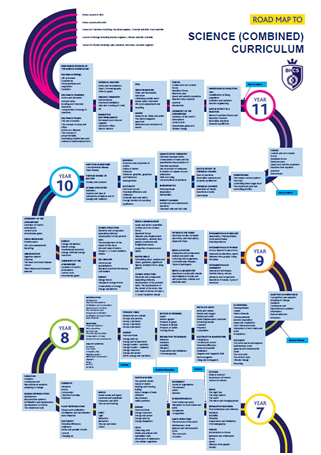Science
Key Contacts:
- Mr S McCulley - Head of Science Faculty
- Ms J Piztek - Assistant Head of Science Faculty
- Mrs M Shaheem-Hamid - Teacher of Science
- Mr D Watkins - Deputy Headteacher / Teacher of Science
- Mr G Wilkinson –Deputy Headteacher/ Teacher of Science
- Mrs S Charde - Teacher of Science
- Miss S Lambert - Teacher of Science
- Miss G Arundale - Teacher of Science/ Acting Head of Year 11
- Mrs B Roman- Teacher of Science
- Mr V Vyas - Teacher of Science
- Miss V Mandiza - Teacher of Science/ Lead Practioner
Our Vision
- The Science faculty’s vision is to enable our students to fulfil their own potential and to reach the highest achievements and qualifications that they are capable of. Our underlying principles are problem solving, critical thinking and mastery. We encourage students to make decisions as young scientists, questioning established theories and gathering ideas about the world around them.
- Our aims are to identify and remove misconceptions and preconceptions and to give every pupil the opportunity to develop their understanding of science at their current working level and be accountable for their own progress whilst not allowing them to ‘coast’.
- Our curriculum is intended to be broad, encouraging students to think as young scientists, gather ideas about the world around them collaboratively and independently and building the science capital of all children, so that success in science is inevitable for all students and more can engage in science throughout their lives.
Key Stages 3 and 4
Our curriculum is a spiral curriculum which allows students to revisit content learnt at different points through theoretical and practical work and at varying levels throughout both Key Stage 3 and Key Stage 4 building on prior knowledge from Key Stage 1 and Key Stage 2.
Our curriculum provides transferrable knowledge and skills that enhance employability and prepare the students for progression into Key Stage 5 or a vocational course. We want our students to enjoy Science and to be able to understand and relate it to the world around them in order to prepare them for the world of work.
At both key stage 3 and Key stage 4 students cover a range of topics with plenty of experimental work where possible. At the end of each term, Key Stage 3 students plan and carry out their own ‘big practical’ assessment to enhance their practical skills.
At identified points students carry out a required practical to further enhance their “working scientifically” skills. Emphasis is placed on ensuring that students have the skills to be able to work as “young scientists”.
Home learning is carefully planned within the curriculum to provide students with an opportunity to practise, embed and apply the knowledge that they have been taught in lessons. Assignments are set to help develop retrieval and spaced learning.
Knowledge organisers support learners for each module of the curriculum at Key Stages 3 and 4, providing them with a precise knowledge to be learned.
Retrieval is built into the start of lessons with the aim that the more the students practice, the more they will remember it.
Enrichment Opportunities
Within our curriculum we offer students the opportunity to learn how science can enrich their lives. The range of possible career routes are planned for discussion in the different topics and embedded into the curriculum.
Students have the opportunity to take part in ‘Hampshire Teen Tech’ in Year 9 which is an interactive event designed to inspire young teenagers about the contemporary world of Science, Engineering and Technology, with experiments and a chance to handle leading edge technology as well as spend time with the Engineers, Technologists and Scientists influencing their 21st century lives.
A STEM club is also an opportunity for Key Stage 3 students to further develop their science skills.
Assessment
Key stage 3
We follow the AQA specification with a clear focus on the science 'Big Ideas'. Each half term students are assessed through open response formal assessments and an end of half term test.
At the end of each term, pupils plan and carry out their own ‘big practical’ assessment to enhance their practical skills.
Key stage 4
We follow the AQA Trilogy course where students are assessed through 6 papers at the of the 3-year GCSE course. The Separate Science course allows pupils to gain three GCSEs in Biology, Chemistry and Physics. Each subject is assessed through 2 papers at the end of the 3-year course. Questions are multiple choice, structured, closed short answer and open response.
Biology Paper 1
- Cell biology
- Organisation
- Infection and response
- Bioenergetics
Biology Paper 2
- Homeostasis and response
- Inheritance, variation and evolution
- Ecology
Chemistry Paper 1
- Atomic structure and the periodic table
- Bonding, structure, and the properties of matter
- Quantitative chemistry
- Chemical changes
- Energy changes
Chemistry Paper 2
- The rate and extent of chemical change
- Organic chemistry
- Chemical analysis
- Chemistry of the atmosphere
- Using resources
Physics Paper 1
- Energy
- Electricity
- Particle model of matter
- Atomic structure
Physics Paper 2
- Forces
- Waves
- Magnetism and electromagnetism
- Space physics. (Separates only)
- Questions in paper 2 may draw on an understanding of energy changes and transfers due to heating, mechanical and electrical work and the concept of energy conservation from Energy and Electricity.


